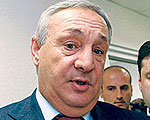
POST-SOVIET SECESSIONIST LEADERS WORRIED BY RUSSIA’S KOSOVO POLICY
Publication: Eurasia Daily Monitor Volume: 4 Issue: 58
By:

Russia’s seemingly staunch defense of Serbia’s “territorial integrity” and threat to veto any form of recognition of Kosovo’s independence is alarming the post-Soviet secessionist leaderships. These had counted on quick international recognition of Kosovo — whether against Russia’s will or as part of a Western bargain with Russia — in order to use the “precedent” or “model” thus created for recognition of Abkhazia, Ossetia, Transnistria, and Karabakh.
The Kremlin had publicly and repeatedly encouraged these leaderships to expect such a course of events. From President Vladimir Putin on down, Russian officials threatened the West and the United Nations with just such a scenario. Conversely, and using parallel or alternative discourses to different audiences, Moscow is increasingly implying that international recognition of Kosovo would establish a dangerous “precedent” with a domino effect and should therefore be avoided. Moscow’s overall goal is not an outcome of either type and probably not yet even a compromise between the two scenarios, but simply to delay any decision and exploit all the negotiating processes for maximum Russian advantage.
Now that Moscow has succeeded beyond expectations to slow down or even block the international negotiations on Kosovo’s status, the post-Soviet secessionists’ chances of official recognition, at least by Russia, seems to be slipping to their fingers. Hoping to retrieve that opportunity, delegations from Abkhazia and South Ossetia — as well as, covertly, from Transnistria — rushed to Moscow in recent days to plead for quick Russian recognition of their secessions.
Abkhazia’s “president” Sergei Bagapsh and “foreign minister” Sergei Shamba, as well as South Ossetia’s “president” Eduard Kokoiti, met with Russian government and Duma officials and held news conferences, one of which also featured Kremlin consultant Sergei Markov. Their core demand is for unilateral Russian recognition as soon as possible, before any international decision is reached regarding Kosovo’s status. If that decision endorses Serbia’s territorial integrity, or if it produces a compromise, the post-Soviet secessionist leaderships fear being dealt a corresponding setback. Consequently, their motto at the public appearances in Moscow became, “It’s now or never” for Russian recognition of their “republics” (Interfax, March 18-20).
Should the negotiated status of Kosovo fall short of independence and international recognition, Sukhumi and Tskhinvali as well as Tiraspol and to some extent Karabakh fear that Russia would have to adopt at least publicly a more ambiguous stance regarding their interests. Thus, they packaged their own demand for recognition in the language of Russia’s geopolitical interests. They argued that Georgia’s admission to NATO is a foregone conclusion, would occur sooner rather than later, would be followed by Azerbaijan, and even Armenia might have no choice but to follow suit. Abkhazia and South Ossetia would become Russia’s last remaining outposts in the South Caucasus and buffers against NATO, they pleaded.
Moreover, they warned, a younger generation of politicians might come to power in Sukhumi and Tskhinvali, with formative experiences different from those of the incumbent generation of leaders. Those future leaders’ behavior would be difficult to predict, particularly when faced with a NATO presence on their doorstep. Inasmuch as the present generation rules out being part of a NATO member country if Georgia joins the alliance, Russia can choose between recognizing Abkhazia and South Ossetia now or “losing the South Caucasus entirely” before long.
For its part, Russia does not at all feel that it must follow the same set of rules or standards for settling the Kosovo and the post-Soviet conflicts. While professing to link those processes for bargaining purposes, Moscow keeps the two tracks starkly distinct from one another in practice. Minister of Foreign Affairs Sergei Lavrov implicitly underscored that dual approach in his March 21 government-hour speech to the Duma. For the first time on the record, Lavrov termed Abkhazia, South Ossetia, and Transnistria “republics,” soon after his MFA had begun referring to those enclaves’ leaders as “presidents” in its official documents. Lavrov’s deliberate choice of words delighted the ultranationalist opposition politician Sergei Baburin, who is a staunch advocate both of Serbia’s “territorial integrity” and, simultaneously, of recognizing the post-Soviet secessionist territories.
The Russian government itself follows that dual approach increasingly boldly. In his speech, Lavrov asserted that any link between the Kosovo resolution and post-Soviet conflict resolution would not be direct or automatic. Whatever the outcome in Kosovo — that is, even if it preserves Serbia’s territorial integrity — Russia will in any case be responsible for the populations of Abkhazia and South Ossetia because they are citizens of Russia, Lavrov argued. The clear implication is that Russia would hold on to these occupied territories of Georgia while at the same time advocating for territorial integrity in the case of Serbia (Interfax, March 21).
Similarly, and on the same day, Russian State Secretary and Deputy Minister of Foreign Affairs Grigory Karasin staunchly defended Russia’s control of the Abkhaz and South Ossetian sectors of the Georgia-Russia border. Refusing to admit to any violation of that internationally recognized border, Karasin adduced for justification that Russia controls those borders effectively, interdicting contraband and arms trafficking (demonstrably a false claim). Russia has officially informed Tbilisi in January of Russia’s position on this issue, Karasin said (Interfax, March 21). However, Russia this simultaneously calls for the inviolability of Serbia’s borders in the case of Kosovo.
The leaders of Armenia and Karabakh are adhering to the familiar position — which was also long shared by their post-Soviet counterparts — that the outcome in Kosovo has little or no bearing on the outcome in their cases. Armenian Minister of Foreign Affairs Vardan Oskanian sums up this position as follows: If Kosovo is internationally recognized as an independent state, Karabakh would gain an additional argument. If the Kosovo conflict is settled in some other way, short of independence and recognition, Karabakh will go its own way in any case (Arminfo, March 21).




